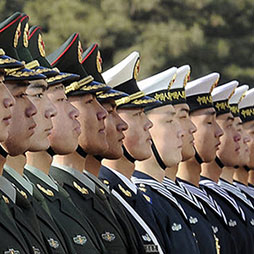Book from the People's Liberation Army Conference
Imposing the Fate of Sisyphus? The PLA as an Instrument of National Power and Force Preparation toward Taiwan
This chapter examines the goals of the Chinese Communist Party (CCP) and People’s Republic of China (PRC) regarding Taiwan under Xi Jinping, how they are pursued through the development and use of the People’s Liberation Army (PLA) in extant and potential campaigns, and PRC perceptions of effectiveness and trends.
EXECUTIVE SUMMARY
MAIN ARGUMENT
Asserting control over Taiwan has been a CCP objective since 1943. The PLA’s posture and employment have strengthened, with capabilities increasing dramatically since the 1995–96 Taiwan Strait crisis. Through his “centennial military building goal” of 2027, Xi seeks a full range of options to coerce or conquer Taiwan. PLA forces, training, and operations are burgeoning accordingly. China currently pursues an all-domain pressure campaign and preparatory exercises, with some timed opportunistically to punish actions by Taiwan or its supporters. Future campaign scenarios include—individually and in combination—coercion or limited force, blockade, bombardment, or invasion. PRC perceptions regarding the effectiveness of Beijing’s actions and cross-strait trends vary but tend toward pessimism, thereby motivating potential use of force.
POLICY IMPLICATIONS
- Xi is rapidly prioritizing tremendous national resources in pursuit of military options regarding Taiwan that his predecessors lacked, with rapid and concerning results.
- New patterns of activity, including pressure operations and preparatory exercises, increasingly threaten, stress, and risk demoralizing Taiwan.
- Military-informed PRC sources insinuate that Washington’s and Taipei’s cross-strait policies and actions are trending in an unacceptable direction, reflecting a failure thus far by Beijing and the PLA to curb them completely; however, the PLA is on track to be able to offer the necessary deterrence or compellence, potentially through CCP authorization to take harsher, more coercive approaches and even credibly threaten war.
- Taiwan and the U.S. must urgently deploy asymmetric capabilities to deter PRC aggression.
Andrew S. Erickson is a Professor of Strategy in the China Maritime Studies Institute at the U.S. Naval War College.
The views expressed here are the author’s alone. He thanks Joshua Arostegui, Brian Davis, Ian Easton, Rob Englehardt, Julia Famularo, David Finkelstein, Conor Kennedy, Dan Kostecka, Ryan Martinson, James Mulvenon, William Murray, Adam Pace, Jeremy Rausch, and Christopher Sharman for their invaluable inputs.



